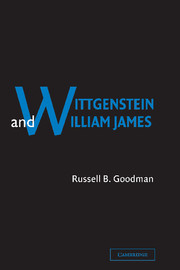Book contents
- Frontmatter
- Contents
- Preface
- Abbreviations
- Introduction
- 1 Varieties of Pragmatic Experience
- 2 Wittgenstein and The Varieties of Religious Experience
- 3 Wittgenstein and The Principles of Psychology: An Introduction
- 4 What Is It Like to Be a Human Being?
- 5 Language and Meaning
- 6 Pragmatism Reconsidered
- Coda
- Notes
- Index
Coda
Published online by Cambridge University Press: 23 July 2009
- Frontmatter
- Contents
- Preface
- Abbreviations
- Introduction
- 1 Varieties of Pragmatic Experience
- 2 Wittgenstein and The Varieties of Religious Experience
- 3 Wittgenstein and The Principles of Psychology: An Introduction
- 4 What Is It Like to Be a Human Being?
- 5 Language and Meaning
- 6 Pragmatism Reconsidered
- Coda
- Notes
- Index
Summary
As we look back over Wittgenstein's long engagement with William James – from his first reading of Varieties in 1912 to his consideration of The Principles of Psychology in the late 1940s – we see one original and powerful philosopher reading and rereading another. James and Wittgenstein offer us two original visions, two “modes of feeling the whole push,” to use James's phrase. I have tried to show how these visions run parallel at certain points, how they diverge at others, and where Jamesean ideas enter the Wittgensteinian stream.
Wittgenstein found James's Principles of Psychology worth thinking with (and against), as he worked to complete one of the great works of twentieth-century philosophy, Philosophical Investigations. At the core of his intellectual relationship with James lies his deep trust in and affection for him, evident in his remark to Drury in 1929 that James was a good philosopher because he was a real human being. Wittgenstein not only found in James's texts a kindred religious spirit who understood the psychology of the “sick soul” and the “twice born,” but a philosopher whose humanity was a part of his philosophical investigations; someone who worked with a sense that the problems of philosophy were not merely technical quandaries but problems of and for human beings.
James and Wittgenstein share a taste for the particularities of human life and a talent for depicting them, whether in the ordinary language dialogues of the Investigations or the portrayals of lived experience in The Principles.
- Type
- Chapter
- Information
- Wittgenstein and William James , pp. 172 - 180Publisher: Cambridge University PressPrint publication year: 2002



